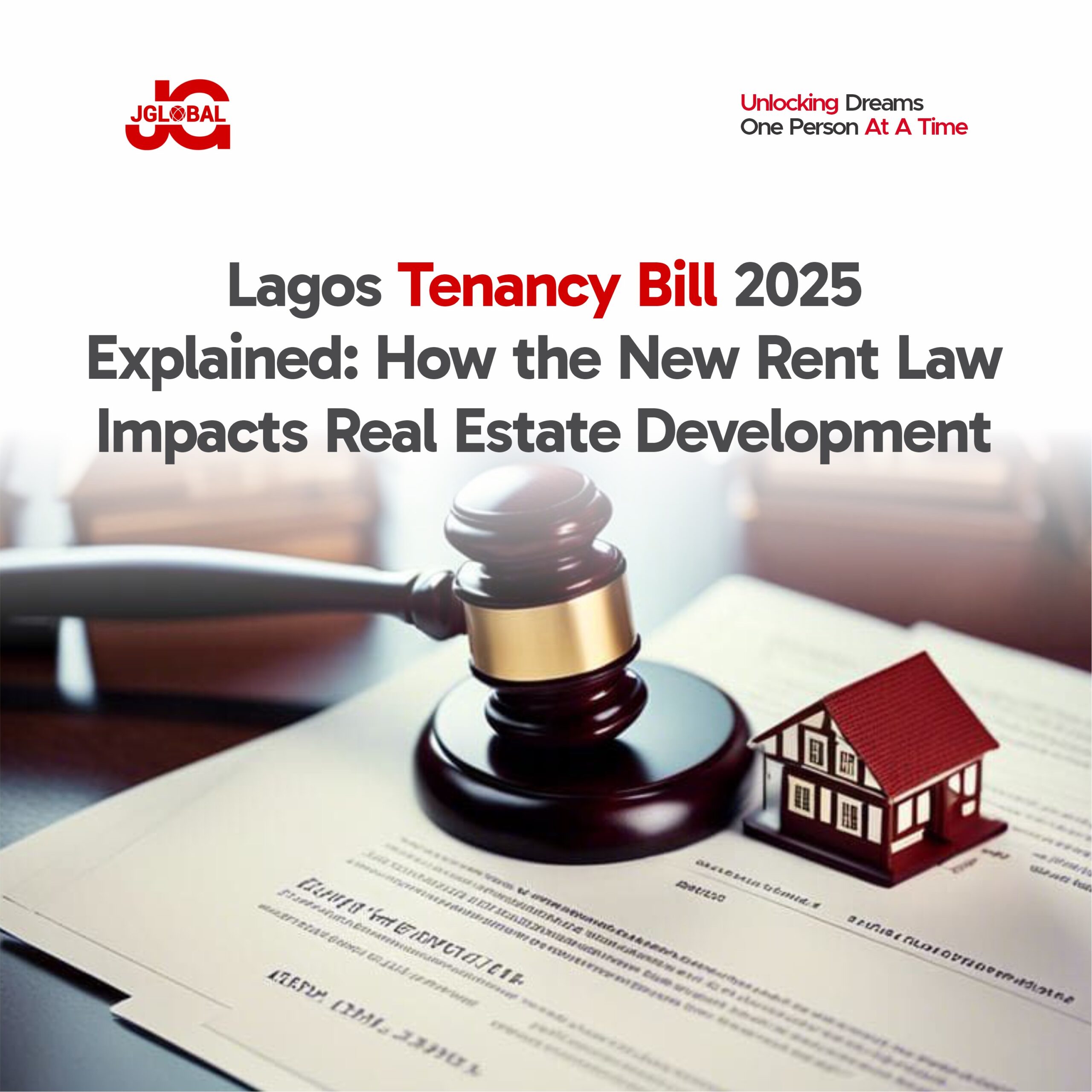Lagos Tenancy Bill 2025 Explained: How the New Rent Law Impacts Real Estate Development

The Lagos Tenancy Bill 2025 is one of the most important housing reforms to hit Lagos in recent years. If you are a tenant trying to understand your rights, a landlord trying to protect your investment, or a developer planning your next project, this new rent law in Lagos affects you directly.
For years, Lagos has struggled with rising rents, unfair tenancy practices, agency fee disputes, and complicated eviction processes. The Lagos Tenancy Bill 2025 is the state government’s attempt to create a more balanced and structured market that protects both landlords and tenants while strengthening real estate development in Lagos.
Before we break down how this law affects developers, landlords, tenants, and the entire rental system, let’s clarify the big question many people are asking.
What Exactly Is the Lagos Tenancy Bill 2025?
The Lagos Tenancy Bill 2025 is a new regulatory framework designed to:
- reduce exploitative rent practices
- cap excessive rent advances
- regulate how agents charge and operate
- professionalize landlord–tenant relationships
- simplify eviction procedures
- create a more predictable rental market
In simple terms, the bill tries to fix the biggest pain points in the Lagos housing market. It redefines the rules that guide renting, paying agency fees, renewing tenancy, and resolving disputes.
Why the Lagos Tenancy Bill 2025 Was Introduced
Lagos is expanding rapidly, but the rental system has remained chaotic for decades. The Lagos Tenancy Bill 2025 aims to solve issues such as:
- High rent advances: Many tenants still pay 2–3 years upfront. The new bill addresses this by introducing a clear rent advance cap in Lagos, especially for low-income and mid-income neighborhoods.
- Unregulated agent fees: Agent fees have always varied wildly. Under the new landlord–tenant law in Lagos, these fees will now follow a structured percentage.
- Complicated eviction processes: Landlords often spend months or years trying to evict illegal occupants. The bill simplifies eviction and sets rules to prevent harassment and unlawful lockouts.
- Lack of professional standards in the rental market: The bill pushes the industry toward documentation, accountability, and fairness.
These changes form the foundation for long-term real estate development in Lagos.
How the Lagos Tenancy Bill 2025 Impacts Real Estate Development
From a real estate advisor’s perspective, this bill has long-term advantages but also short-term challenges. Developers, investors, and landlords should understand how it will shape future projects.
- Better Predictability for Developers: The Lagos Tenancy Bill 2025 will bring about a regulated market and a regulated market gives developers clarity when planning rental projects.
With clearer rules on rent collection, rent advances, and eviction, developers can:
- estimate rental income more accurately
- plan better financing
- attract more institutional and foreign investors
- build for long-term returns
Predictability reduces risk, which ultimately strengthens real estate development in Lagos.
- Rent Caps May Shift Developer Priorities: A rent cap is a government-imposed limit on how much a landlord can charge for rent or how much rent is allowed to increase within a certain period. While the Lagos Tenancy Bill 2025, may reduce the pressure on tenants, it may affect developer confidence in some locations.
Developers may begin shifting focus towards:
- mid-income estates
- build-to-sell projects
- short-let apartments
- co-living spaces
- mixed-use developments
The areas most affected by the rent advance cap in Lagos are likely to see developers become more selective.
- Possible Rent Adjustments in High-Demand Areas: When upfront payments reduce, landlords may adjust rental prices to maintain stable income.
Areas like Lekki, Ikoyi, Yaba, Ikeja GRA, Surulere, and Ajah may experience:
- more competition
- higher property standards
- slightly increased annual rent
This is one of the side effects of the new rent law in Lagos.
- Agency Regulation Can Improve Investor Confidence: For the first time, agent activities will be properly regulated.
This Tenancy Bill will improve:
- transparency
- accountability
- professional conduct
- investor trust
Foreign investors especially prefer markets with clear landlord–tenant laws. This bill makes Lagos more attractive for long-term real estate investments.
- Faster and Clearer Eviction Processes: One major fear landlords and developers face is the painful eviction process.
The Lagos Tenancy Bill 2025 simplifies this, making eviction:
- More structured
- legal
- less costly
This reduces the risk of income loss and encourages more people to invest in rental properties.
- A New Push Toward Multi-Family Developments: Because tenants will no longer be expected to pay heavy upfront rent, more people will rent homes.
This will increase demand for:
- studio apartments
- one-bedroom units
- co-living apartments
- multi-family buildings
Developers who adapt to these changes early will dominate the future rental market.
Key Provisions of the Lagos Tenancy Bill 2025
- Advance Rent Restriction: Under the Lagos Tenancy Bill 2025, landlords are prohibited from demanding more than three months’ rent in advance for monthly tenants and one year’s rent for annual tenants. Anything above this is treated as an offence.
- Rent Cap Framework: The Lagos Tenancy Bill 2025 introduces a structured rent cap system that prevents arbitrary rent increases. Landlords are required to give proper notice before any increase, and such increments must be reasonable and justified.
- 5% Agency Fee Limit: The Lagos Tenancy Bill 2025 caps agency or commission fees at a maximum of 5% of one year’s rent. Agents who violate this cap may face fines or imprisonment.
- Mandatory Rent Receipts: Issuing rent receipts becomes compulsory under the Lagos Tenancy Bill 2025. Every receipt must include the tenant’s name, property address, rent amount, payment date, and rent duration.
- Protection Against Illegal Evictions: The Lagos Tenancy Bill 2025 outlines a formal eviction process. Landlords cannot evict tenants without court orders, disconnect utilities, or harass tenants as a means of recovering premises.
- Tenant’s Right to Quiet Enjoyment: The Lagos Tenancy Bill 2025 reinforces that tenants have the right to peaceful occupation of the property, provided they comply with the tenancy agreement.
- Landlord Maintenance Obligations: Landlords must maintain the property in good condition, especially shared spaces, as stated in the Lagos Tenancy Bill 2025. Neglecting essential repairs can attract penalties.
- LASRERA Registration Requirement: Agents operating under the Lagos Tenancy Bill 2025 must be registered with LASRERA. Unregistered agents are not legally permitted to conduct transactions.
- Compensation for Improvements: When tenants make improvements with the landlord’s written approval, the Lagos Tenancy Bill 2025 allows them to claim compensation for any unexhausted value if they are asked to leave.
- Penalties for Violations: The Lagos Tenancy Bill 2025 introduces fines and possible jail terms for landlords or agents who breach the provisions, including overcharging, unlawful rent collection, and illegal eviction practices.
Conclusion
The Lagos Tenancy Bill 2025 is not perfect, but it is a major step toward a healthier rental system. If implemented with transparency and continuous review, it can:
- reduce tenant exploitation
- increase investor confidence
- professionalize agency operations
- encourage predictable real estate development
- create a balanced and transparent housing market
Lagos is evolving, and the rental system must evolve with it. This bill is part of that transition.



